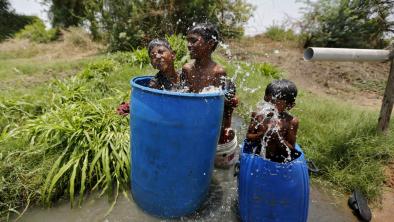Three Things That Wouldn't Have Happened in 2016 without Climate Change

“Impossible” is a fraught word, but a new set of studies concludes that at least three atmospheric and oceanic phenomena from 2016 wouldn’t have occurred had we not been adding greenhouse gases to the air for more than a century.
Record heat in Asia, record-high global temperature, and a marine “heat wave” in the far North Pacific are among 27 events analyzed in “Explaining Extreme Events in 2016 from a Climate Perspective.” This report, free to download in its entirety, is the sixth annual compilation of climate attribution studies published as a supplement to the Bulletin of the American Meteorological Society (BAMS). The 2016 report was released on Wednesday.
The BAMS series has become the leading venue for papers in the climate-science subfield called detection and attribution (D&A). The idea in such work is to identify a measurable weather/climate change (detection) and to determine what caused it (attribution). Most D&A studies end up yielding probabilities, typically the extent to which odds of a given event have been raised by climate change. This year, the BAMS report includes three events that go so far beyond any modern precedent that they can’t be explained without invoking human-produced greenhouse gases.
...
Those who caricature climate science as being a monolithic echo chamber might be surprised at the range of conclusions in attribution research. Out of the 130 studies published in the six years of BAMS supplements, about 32% found no link between a given extreme event and long-term climate change. In their introduction, the editors stressed: “…this publication prides itself as a venue that accepts papers without consideration for whether a role for climate change is found.” In fact, the editors have started to limit the number of heat-related papers only because climate change is so firmly and clearly implicated in recent global heat: “Given that the majority of heat papers now use a widely established and accepted methodology, the scientific value of continuing to include a large number of heat studies began to seem limited.”
By the same token, it’s heat-related findings that have risen to a new level of confidence, as demonstrated in three of this report’s papers.
Related Content





